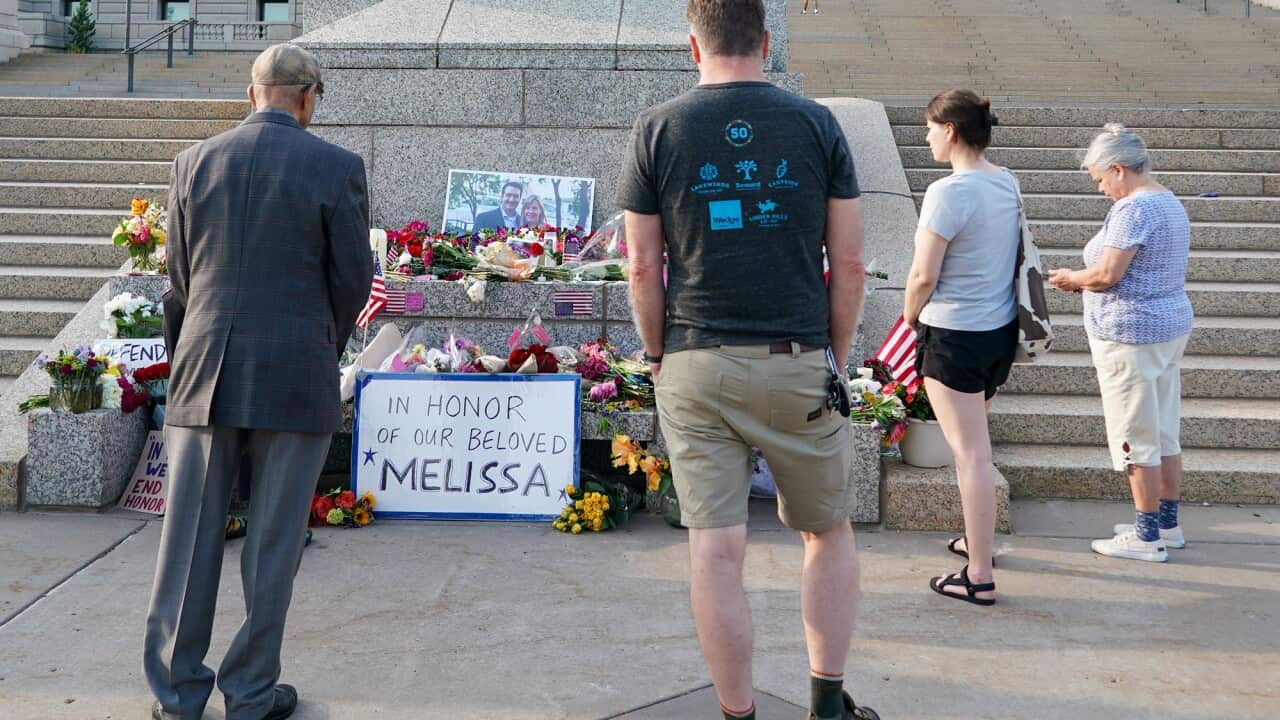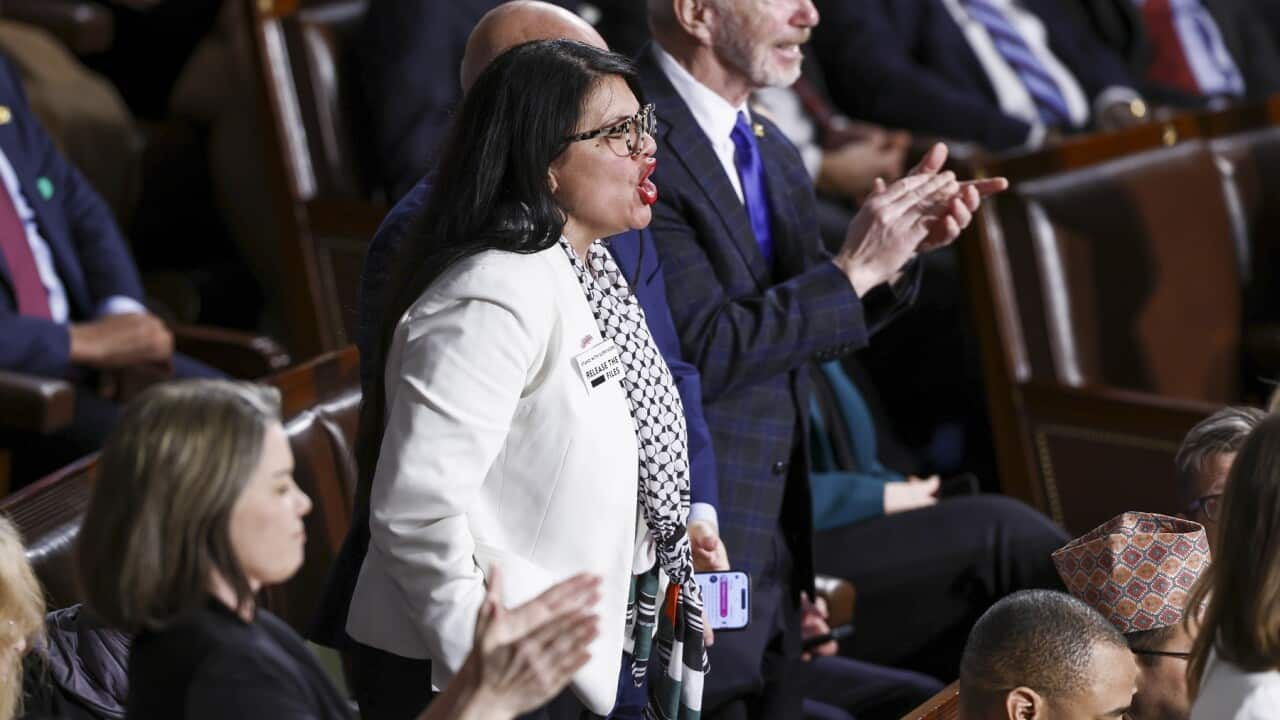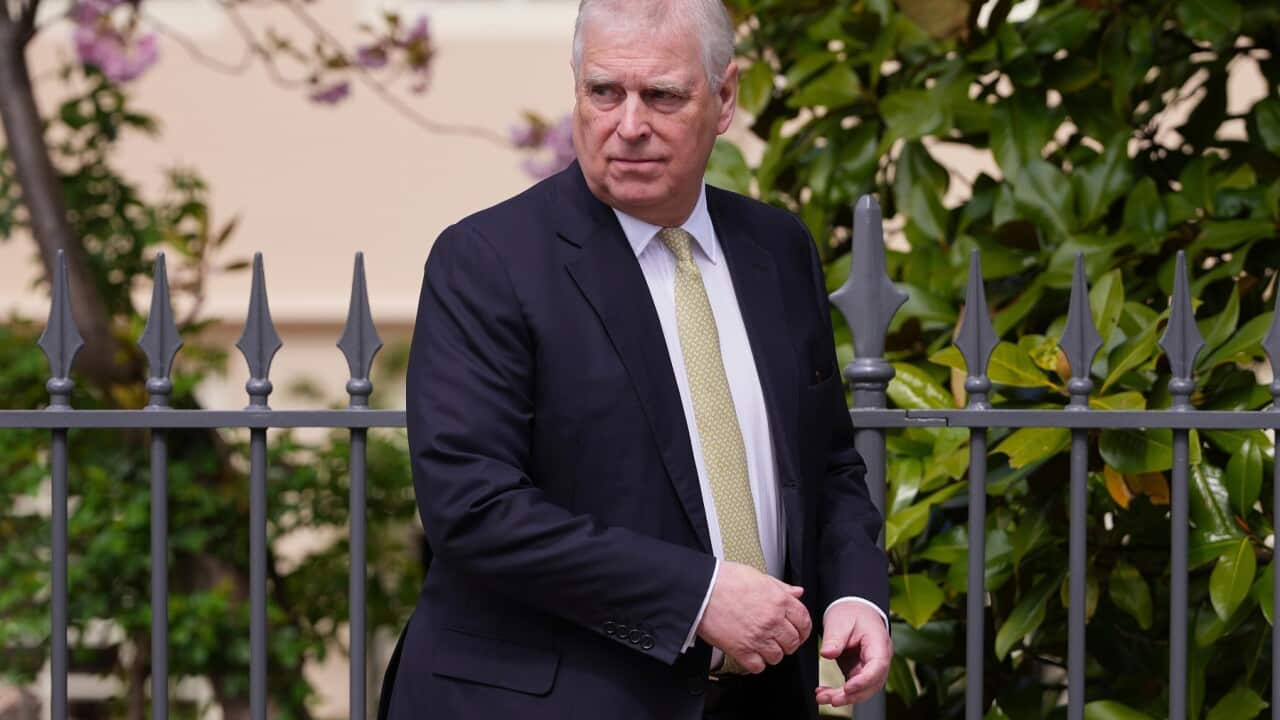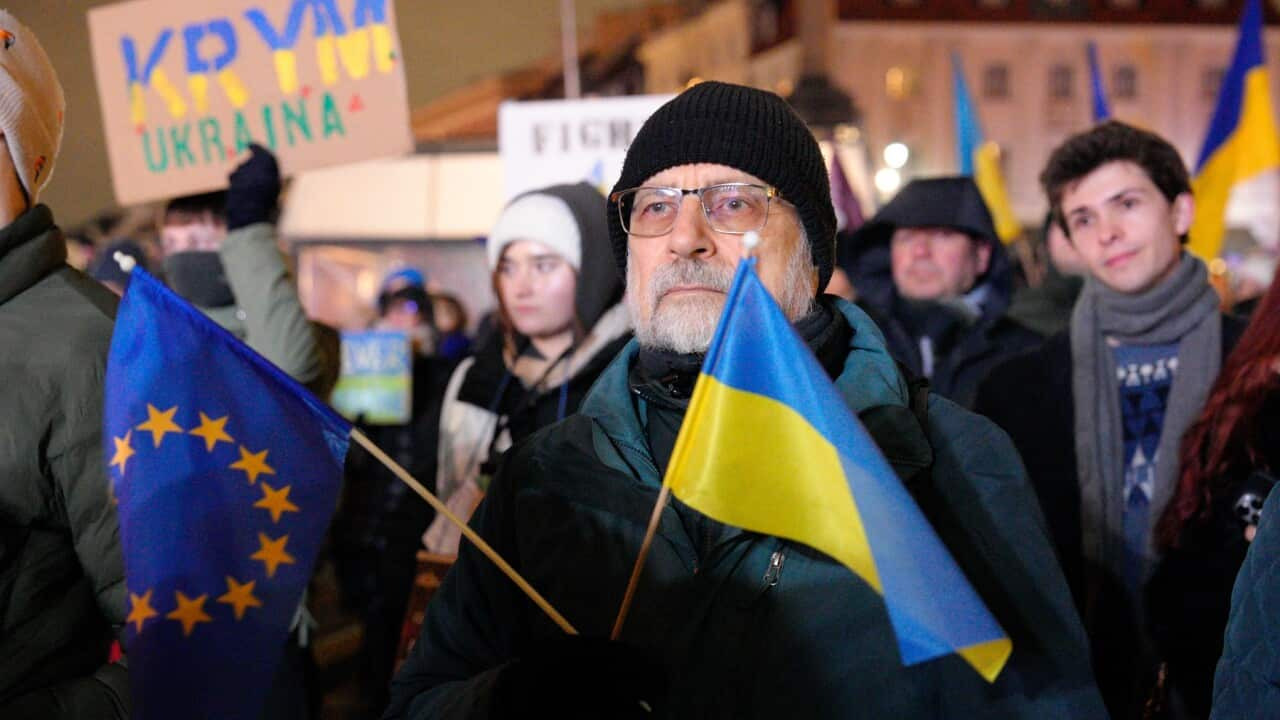Listen to Australian and world news, and follow trending topics with SBS News Podcasts.
TRANSCRIPT
"We are here today because an unspeakable tragedy has unfolded in Minnesota. My good friend and colleague, Speaker Melissa Hortman and her husband Mark, were shot and killed in what appears to be a politically motivated assassination. My prayers also go out to state Senator John Hoffman and his wife Yvette, who were each shot multiple times. The Hoffmans are out of surgery at this time and receiving care and we are cautiously optimistic they will survive this assassination attempt."
That is Governor Tim Walz, the governor of the US state of Minnesota.
He was delivering the sombre news of the shootings of two Democratic politicians and their partners - two of them fatally - by a suspect identified as a deeply conservative Republican who opposed abortion.
"This was an act of targeted political violence. Peaceful discourse is the foundation of our democracy. We don't settle our differences with violence or at gunpoint."
The shootings have prompted authorities across the US to tighten security.
In Colorado, at least 31 elected officials have asked for their personal contact information to be taken down from a public-facing state campaign finance database called TRACER.
In North Dakota and New Mexico, members' addresses have been removed from their biographical and legislature websites - though in the latter's case, personal information had already been limited after drive-by shootings at the homes of four Democratic state and local politicians in Albuquerque in 2022 and 2023.
Florida Polk County Sheriff Grady Judd has told Fox News these precautions are a good thing, in case anyone else gets any ideas.
"And there's other copycats across this nation, I fear, that are just as evil and just as deranged, that there may be a subsequent event."
They're also talking about security at the federal level.
In Washington DC, an emergency session has been held on security measures, some of the meeting centering around cuts earlier this year to a Department of Homeland Security program known as CP3, a program that focused on understanding and preventing grievance-based incidents of violence and mass shootings.
Their concerns appear to be well-founded - because as George Washington University Professor Matthew Dallek has told CBS News, there's been a steady rise in political violence in America in the last decade.
"So this is I think going to be a debate many decades from now - when did this period start. And Gabby Giffords is I think a reasonable place - a reasonable starting point. The white supremacist riots in Charlottesville is another, I think, signature moment."
A number of studies and reports have supported this conclusion.
In 2023, Reuters filed a special report that found political violence in the US is the worst it's been since the 1970s - with almost 40 people killed and scores of others wounded in politically motivated attacks.
A few incidents have been carried out by left-wing activists, including the 2017 attack in Virginia against Republican Majority Whip Steve Scalise, among others.
Excerpt of US news report: "It was an ambush. Several republican members of Congress targeted while practising for a charity baseball game."
But the Reuters report concluded - as others have done - that most of this violence has come from extremists on the right in the form of shootings and physical attacks.
Targets have often been well known figures like the husband of Democrat Nancy Pelosi, attacked in their California home in 2022 by a man who was angry that the former Democratic Speaker of the House supported an inquiry into Russian interference in the 2016 presidential campaign.
Yet there have been ordinary people touched by politically motivated violence too, like the King family in Ohio.
Operator: "Fowler County 911, what is your emergency?"
Young man: "My neighbour just shot my dad...."
Kristen: "He’s come over, like, four times confronting my husband because he thought he was a Democrat."
Perhaps the best known example of political violence is the now infamous January 6, 2021 attack on Washington DC by Donald Trump supporters, encouraged by the then candidate Trump to express their anger over Joe Biden winning the 2020 election.
(Sound of glass being smashed and rioters yelling. Fade out underneath.)
Officer: "This is now effectively a riot."
Dispatch: "1349 hours, declaring it a riot."
Later, Donald Trump was himself the target of two assassination attempts during the 2024 election campaign, including in Butler, Pennsylvania.
(Sound of Trump being interrupted mid-speech by the shooting)
Republican and Democratic politicians across the country have reacted with shock and horror, issuing calls to tone down increasingly heated political rhetoric.
Among them is Senate Minority leader Chuck Schumer .
"When political opponents are treated like enemies, danger follows."
Meanwhile, as the world watches events unfold in the US, questions are being asked about political violence in other western countries, and if these trends are being felt in Australia.
Australian Federal Police Commissioner Reece Kershaw told Senate estimates earlier this year there had been an increase in threats against office holders and electorate offices since last year, with 712 reports of threats in the financial year to date.
Some of these tensions were evident during the 2025 election campaign, with multiple instances of volunteers being threatened or attacked, like this incident against a Trumpet of Patriots volunteer at a Melbourne pre-polling station.
(Sound of a scuffle)
Man 1: "Hey calm down."
Man 2: "Oi, oi, oi. Cut it out. Cut it out."
There was also a well-documented incident at a prepoll booth in Anthony Albanese's own seat of Marrickville.
Greens volunteer Catherine Stuart told Channel 9 it happened when a female volunteer asked a man wearing a Make America Great Again cap to stop scribbling on Labor posters.
"He started yelling at the lady and coming towards her, and then out of the blue a young man just came up and yelled something like 'don't attack a woman' - and he punched him in the head."
Assistant Commissioner Peter McKenna promised extra patrols during the campaign as a precaution against further incidents, saying it seemed to be a common trend for voters and candidates to be on edge.
"Right around the world at the moment there are heightened emotions with elections. It's not what we want to see here in Sydney."
Back in the US, Professor Matthew Dallek says much of these heightened tensions are the result of heated rhetoric from Donald Trump, who he says has become infamous for extreme language, inflammatory statements, and insults against his opponents.
"Trump has been both obviously a victim of violence. I think also an accelerant in terms of his language, the pardons of the convicted January 6 police beaters and other felons."
Cynthia Miller-Idriss is the director of American University’s Polarisation and Extremism Research and Innovation Lab.
She has told PBS NewsHour that there is something more fundamental at play, namely an increasing acceptance that it's okay to step outside established moral and legal boundaries if political differences are at stake - in other words, that the end justifies the means.
"We're seeing increasing support for political violence and also increasing willingness to engage in it - among ordinary Americans. And that's what I mean about everybody seeing this as a moment of reckoning for themselves and their own behaviour, not just to wag fingers at the elites and politicians who are behaving badly. But to think about what you do across the dining room table, what you're doing in your classrooms, what you're doing with your colleagues and your neighbours. Because any time you're justifying that kind of violence, you never know who is going to overhear that, or how that contributes to the overall climate in which violence is seen as a solution."













